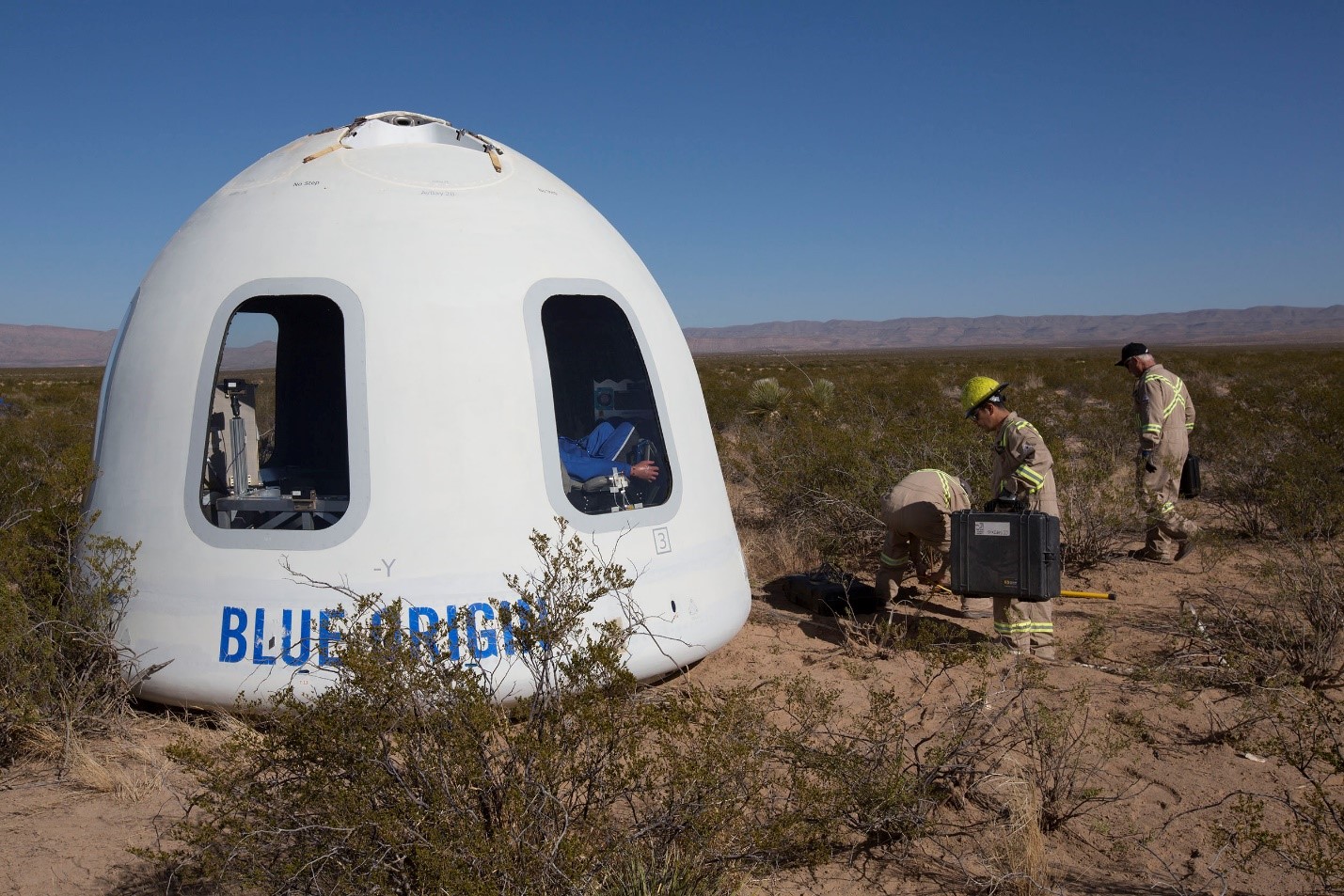Blue Origin: what is it and how is it different to SpaceX?
Jeff Bezos’s start-up may one day transport a small group of passengers to sub-orbit

A free daily email with the biggest news stories of the day – and the best features from TheWeek.com
You are now subscribed
Your newsletter sign-up was successful
SpaceX, the aerospace firm founded by the tech entrepreneur Elon Musk, has dominated headlines in recent years thanks to a number of high-profile rocket launches and bold publicity stunts.
The frequency of the company’s missions, often in partnership with Nasa, suggest it’s the only firm truly invested in advancing space travel, but the launch of Blue Origin’s New Shepard craft on Sunday shows that SpaceX doesn’t have the industry to itself.
Sunday’s launch of the spacecraft is the eighth successful mission carried out by the US-based aerospace start-up which is hoping to one day transport a small group of passengers to the fringe of space.
The Week
Escape your echo chamber. Get the facts behind the news, plus analysis from multiple perspectives.

Sign up for The Week's Free Newsletters
From our morning news briefing to a weekly Good News Newsletter, get the best of The Week delivered directly to your inbox.
From our morning news briefing to a weekly Good News Newsletter, get the best of The Week delivered directly to your inbox.
Here’s everything you need to know about Blue Origin and what sets it apart from SpaceX:
What is it?
Blue Origin is an aerospace start-up firm established by Jeff Bezos, the Amazon founder and tech entrepreneur.
The company was founded in 2000 as a a “pet project” for the billionaire, who was keen on the idea of “developing economies” in space, says Teslarati.
A free daily email with the biggest news stories of the day – and the best features from TheWeek.com
After spending over a decade in development, Blue Origin’s small New Shepard craft made its debut in 2015, according to the website. The start-up also launched a “multi-year program” to trial the space ship.
New Shepard is primarily designed to carry a small group of passengers into sub-orbit for about four minutes, according to The Verge.
Now that the company has carried out eight successful launches, Space.com says New Shepard is expected to undergo more test flights over the coming months. The vessel is expected to make its first maiden voyage with passengers this year.
What makes Blue Origin different to SpaceX?
Given that both Blue Origin and SpaceX are private aerospace firms founded by tech billionaires, comparisons are being drawn between the two firms.
But Engadget says that while the companies appear to be similar at first glance, they both have different goals.
Blue Origin, for example, is focusing on sub-orbital space flight that allows passengers to experience the sensations of space without leaving Earth’s atmosphere, The Verge says. New Shepard doesn’t have the power to leave the Earth’s atmosphere and enter orbit, so the vessel returns to the planet’s surface a few minutes after entering sub-orbit.
Meanwhile, SpaceX’s goals centre around lowering the cost of space flight, the website says, with the hope of one day launching a manned mission to Mars. The company’s rockets also carry “payloads”, including satellites and cargo.
There are, however, some similarities between the two.
CNet says Blue Origin’s most recent launch featured a rocket that had been sent into orbit on a previous mission.
This reuse of old rockets also happens at SpaceX. An older version of its Falcon 9 vessel launched in March 2017. In fact, SpaceX was the first aerospace firm to deploy reusable rockets.
What rockets does Blue Origin use?
Blue Origin currently has just one rocket in its line-up – the compact New Shepard.
The rocket is capable of reaching an altitude of around 62 miles above the Earth’s surface, says CBS News.
A rocket booster is used to propel New Shepard to an altitude of 42 miles, the news site says, before it’s jettisoned into space. The craft then climbs a further 20 miles using smaller onboard boosters.
Blue Origin plans to add another rocket to its line-up that will allow the aerospace firm to launch payloads into orbit, says CNBC.
The new rocket, which is called New Glenn, will be significantly larger than New Shepard, the news site says, opening the service up to customers in the “civil, commercial or military” industries.
New Glenn is expected to make its debut launch in 2020.
-
 How to Get to Heaven from Belfast: a ‘highly entertaining ride’
How to Get to Heaven from Belfast: a ‘highly entertaining ride’The Week Recommends Mystery-comedy from the creator of Derry Girls should be ‘your new binge-watch’
-
 The 8 best TV shows of the 1960s
The 8 best TV shows of the 1960sThe standout shows of this decade take viewers from outer space to the Wild West
-
 Microdramas are booming
Microdramas are boomingUnder the radar Scroll to watch a whole movie
-
 Are AI bots conspiring against us?
Are AI bots conspiring against us?Talking Point Moltbook, the AI social network where humans are banned, may be the tip of the iceberg
-
 Elon Musk’s pivot from Mars to the moon
Elon Musk’s pivot from Mars to the moonIn the Spotlight SpaceX shifts focus with IPO approaching
-
 Moltbook: the AI social media platform with no humans allowed
Moltbook: the AI social media platform with no humans allowedThe Explainer From ‘gripes’ about human programmers to creating new religions, the new AI-only network could bring us closer to the point of ‘singularity’
-
 Will regulators put a stop to Grok’s deepfake porn images of real people?
Will regulators put a stop to Grok’s deepfake porn images of real people?Today’s Big Question Users command AI chatbot to undress pictures of women and children
-
 Data centers could soon be orbiting in space
Data centers could soon be orbiting in spaceUnder the radar The AI revolution is going cosmic
-
 Inside a Black community’s fight against Elon Musk’s supercomputer
Inside a Black community’s fight against Elon Musk’s supercomputerUnder the radar Pollution from Colossal looms over a small Southern town, potentially exacerbating health concerns
-
 X update unveils foreign MAGA boosters
X update unveils foreign MAGA boostersSpeed Read The accounts were located in Russia and Nigeria, among other countries
-
 What's Linda Yaccarino's legacy? And what's next for X?
What's Linda Yaccarino's legacy? And what's next for X?Today's Big Question An 'uncertain future' in the age of TikTok